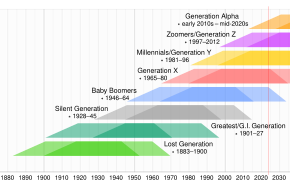| Part of a series on |
| Social generations of the Western world |
|---|
 |
Many demographic analysts refer to the current generation of young people as Generation Z. Generation Z comprises those born between 1997 and 2012, according to the Pew Research Center. The eldest members of this generation are currently 25 years old, with many having graduated from college, married, and starting families. They're just behind the millennials (1981 to 1996). Members of Generation Z confront a future that is more unclear than that of many earlier generations as a result of the COVID-19 pandemic.
Generation Alpha is the generation following Generation Z and currently includes all children born in or after 2010—the same year the iPad was born. The majority of this demographic is under 12 years of age, but the oldest of them will become teens in 2022. The term “Generation Alpha” was coined by consulting agency McCrindle in a 2008 report on the subject. According to the firm’s latest report, by 2025, this generation will number more than two billion the largest generation in history.
Future generations are the generations of people to come in the future, after the currently living generations of humans. The future generation is contrasted with current and past generations. The moral patienthood of future generations has been argued for extensively among philosophers, and is thought of as an important, neglected cause by the effective altruism community.The term started to be used in reference to the impact which the currently living generation has on the world which future generations will live in, the world they will inherit from humans living today. This concept is referred to in the most widely quoted definition of sustainability as a part of the concept sustainable development, is that of the Brundtland Commission of the United Nations on March 20, 1987: “sustainable development is development that meets the needs of the present without compromising the ability of future generations to meet their own needs.”In Wales, this moral obligation is encoded as a legal duty in the Well-being of Future Generations (Wales) Act 2015 and in the role of the Future Generations Commissioner. Similarly in Hungary the office of the Hungarian Parliamentary Commissioner for Future Generations was established in 2008.